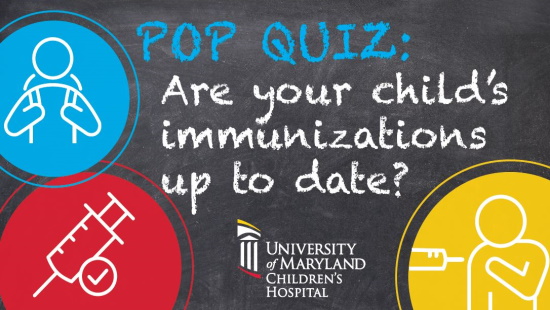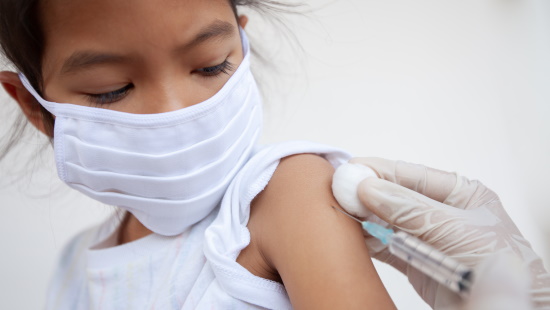Request an Appointment

Request an Appointment

Vaccines for kids are essential for keeping children healthy, now and throughout their lives. Without childhood vaccines, kids are at risk of preventable diseases, whether or not they are in school.
This is why it is crucial that children receive immunizations on the recommended vaccine schedule.
If unvaccinated, many children can become seriously ill or even die from diseases such as measles, mumps and whooping cough. They can also pass on these illnesses to others in the community who are not able to be vaccinated yet, typically infants.
In a world full of uncertainty, routine childhood vaccination is the most important protection we can give our children against infections.
For parents, keeping kids healthy is always a top priority. At the University of Maryland Pediatrics at Midtown, it's our top priority too.
We have many patient safety guidelines in place at our facilities. And we are open and ready to care for your child.
Routine childhood vaccinations keep your kids safe from potentially deadly infectious diseases, including
Vaccines for kids start as early as birth and can be given through adulthood. The schedule of vaccines at specific ages is based on data showing when children are at the highest risk and at what ages vaccines work best.
The Centers for Disease Control and Prevention's immunization schedule provides more details about when each vaccine should be given and special considerations for specific vaccines for those with certain medical conditions.
If you think your child has missed any vaccination shots, talk to your child's pediatrician as soon as possible.
Although the recommended schedule for each vaccine is ideal, often you can continue where you left off or get "catch-up" vaccinations. Your child's pediatrician can recommend the best way to resume vaccinations and how to help your family stay on target in the future.
Immunizations are an essential part of the preventative care offered at UM Pediatrics at Midtown. In addition to routine vaccines, UM Pediatrics at Midtown offers catch-up vaccines for kids who are behind and vaccines for kids who have special needs and need additional protection.
In a world where there is a lot of information about vaccines for kids available to parents — both accurate and inaccurate — the pediatricians at UM Pediatrics at Midtown are here to help.
Thanks to the development of vaccines, there are many diseases we no longer see. Some are gone altogether, but some are still out there. The reason children in the United States rarely fall ill with potentially deadly infectious diseases because vaccines protect them. If we stop vaccinating or reduce our vaccination rates, these diseases will most likely return.
Vaccines that are made with just a part of the pathogens or with killed pathogens are not able to cause disease. In theory, live but weakened vaccines can cause disease. However, these vaccines contain pathogens that are very weak and unlikely to cause disease in a healthy person.
Because these vaccines with a weakened can cause serious problems for someone with a compromised immune system, talk to your child's doctor about which vaccines are safe and recommended for him or her.
The vaccine itself does not make your child sick. Most children don't have any reactions at all to a vaccine, and if they do, they are mild symptoms such as soreness or redness near the site, fatigue or low-grade fever.
Those reactions are actually signs that the vaccine itself is working. They occur because the body is reacting to and developing the antibodies that, if your child is exposed to the disease, are primed to protect them.
This concept, known as herd immunity, is the idea that if everyone around you is vaccinated, an unvaccinated child is still protected.
But when fewer children in a community are immune, it is easier for a disease to spread from person to person and cause an outbreak. It is important to remember that herd immunity decreases the level of disease in a community. It doesn't mean that an individual child cannot develop the disease.
Every ingredient that is in a vaccine serves a purpose:
These ingredients have been clinically tested and proven safe.